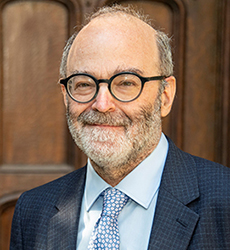Message from the Dean
Welcome to the Divinity School!
When I first arrived at The Divinity School as a junior faculty member, I was given the task of representing our religious studies program at an undergrad student fair. I shared the table with a professor in sociology, and at one point, between our conversations with eager undergrads, he leaned over and asked with an ironic smile: “what do you do in the Divinity School — divine?” My response: “We do everything you do, but do it better.”
When I think about that encounter now (the insecurity of a young scholar just out of grad school) I am both chagrined and somehow — dare I say it — proud. The idea expressed, however brashly, has held true with me ever since. We do everything “they” do — in the other divisions around campus because we draw freely from across disciplines, and we are in many ways a microcosm of the University as a whole. And we do it “better” because we use everything (or at least try to) as we adapt different methods, theoretical frameworks, old and new, traditional and innovative, focusing them on a single subject or subjects, really a complex of subjects, a category that defies conceptualization more than any other: “religion.”
It Is this study of a single subject from multiple perspectives that allows the Divinity School to be a rare place of genuine interdisciplinarity, where methods can mix freely to create something new, where colleagues can disagree — as we always do — about definitions and tools without ever accepting that questioning and experimentation doesn’t matter. On the contrary: it is the instability of subject, on the one hand, and diversity of method, on the other, that contributes to a place always becoming greater than the sum of its parts.
“Religion” is the central focus one might say, the idea of religion or one particular religion, a religion in a place or a time, east or west or south or north, in the past or the present, or even into the future, since reflection can lead to change, study to practice. The study of “religion”, to say it another way, is a place where the thing that can’t be defined is examined in every way possible, where the critical and the spiritual can live together in a tense but productive relationship.
As I welcome you to the Divinity School, I also invite you to explore our degree programs — BA, MA, MDiv, AMRS and PhD — and to familiarize yourself with the many vibrant aspects of student life here, such as our myriad workshops and clubs. Join us in learning from scholars, experts, and practitioners at any of our frequent public events (both in person and online) and with the Martin Marty Center for the Public Understanding of Religion, where we work to engage the wider world on the important questions we, scholars of religion, ask. Find your place in our 125-year-old center of learning in the heart of campus.
James Theodore Robinson
Dean of the Divinity School; Nathan Cummings Professor of Jewish Studies; Professor of the History of Judaism, Islamic Studies, and the History of Religions in the Divinity School and the College


